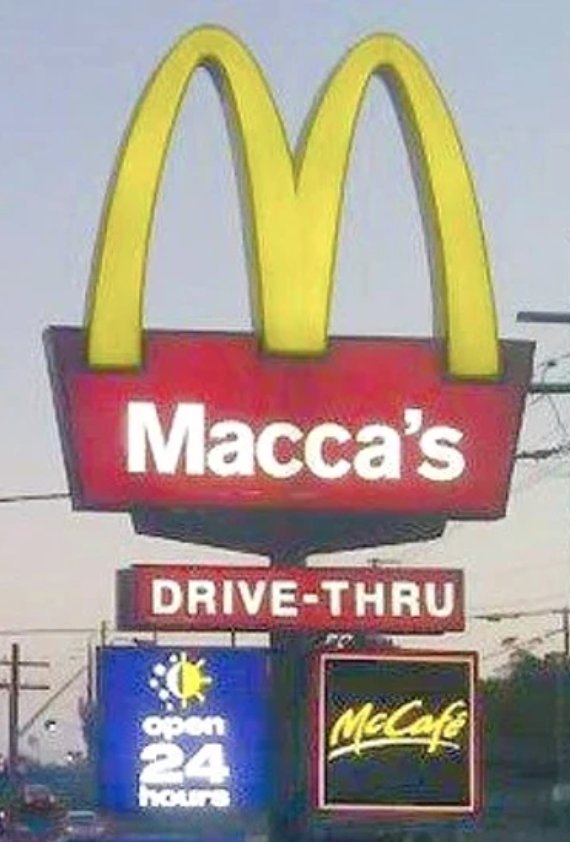By NATALIE MEYER
Global Business Journalism reporter
PERTH, AUSTRALIA – To meet shifting consumer demand amid the COVID-19 pandemic, Macca's, the Australian branch of McDonald’s, has added staple foods such as liters of milk and gourmet bread rolls to its regular fast food menu.
In Western Australia, an adult entertainment venue is trying to still make a buck while its venues are closed by sending its scantily clad female staff to deliver food to, and titillate, its customers who cannot patronize its shuttered venues. It calls its new venture “Boober Eats.”
The coronavirus, which spread from Wuhan, China, to almost every nation in the world, has caused businesses large and small to make strategic moves as they fight to stay afloat during the economic crisis caused by the pandemic. The challenge is particularly acute for food and beverage businesses, which have been shut down for months as governments try to limit the risk of spreading the virus in crowded kitchens and crammed venues.
Industry giants like McDonald’s usually enjoy large profits globally, but even they aren’t immune to the financial challenges now sweeping Australia’s catering sector. Forced to stop their Australian dine-in service from March 23 per national restrictions, McDonald’s has had to make some adjustments to business-as-usual.
Yet with their drive-through service still an option, Australian fans of a Big Mac burger are luckier than their counterparts in the UK and Ireland, where all operations have been temporarily closed.
McDonald’s stores in Australia announced on April 1 that household staples had been added to their regular Golden Arches menu.
“In addition to our usual Macca’s menu, customers will also be able to pick-up two or three liter bottles of full cream or skim milk, as well as packs of English muffins and gourmet bread rolls,” a spokeswoman from McDonald’s Australia said in a statement.

Need a liter of milk? You can get it, along with other staples, at the Golden Arches.
In Western Australia, an adult entertainment venue in the mining centre of Kalgoorlie-Boulder has turned to food delivery to keep their scantily clad staff employed and customers entertained.
Known for its annual Diggers and Dealer’s forum which draws international miners and investors, Kalgoorlie has had topless barmaids working at venues like Gold Bar since the 1990s. But with the pandemic causing hospitality staff and customers to stay home, business owner Natalie Poole came up with a creative way to offer ongoing employment.
Launching a food delivery service with lingerie-clad girls, Poole pivoted her bikini barmaid business into “Boober Eats.” For a $30 fee, lonely customers in Kalgoorlie can order their meals delivered to their driveway and have a chat with their delivery girl from a safe distance of 1.5 meters.
Poole, who owns Kalgoorlie’s La Femme Fatale Agency, said that the service was so popular on the first night that they were struggling to meet demand. Now she’s planning on offering the service nationwide.
“I'm getting a lot of calls for it across Australia,” Poole said. “For the rest of this week, I will focus on Kal [Kalgoorlie], then start sending out girls in the rest of Australia.”
While the concept is new in Australia, Poole might need to rebrand her delivery business in the near future. The cleverly named business isn’t unique to Australia; the same service launched in Oregon in March. But Poole’s idea won the attention (and ire) of the global delivery giant whose name she appropriated: Uber Eats. Within a month of the opening of Boober Eats in Oregon, Uber handed Lucky Devil Lounge a cease-and-desist order for their stripper food delivery.
It’s not just multinational fast food chains and adult entertainment venues that are changing their product offerings. There are thousands of cafes, bars and restaurants across Australia who have been forced to shut their physical doors and move to food delivery in order to survive the crisis.
Up until 2019, the Australian hospitality industry had been experiencing annual sector growth of 1.5 percent for five years. With close to a million employees and over 130 000 businesses as of 2018, industry revenue was forecast to exceed $108 billion by 2023.
In 2018, Australian restaurants were raking in over $20 billion, cafes and coffee shops over $9 000 million, and pubs, bars and nightclubs over $17 billion. Now all of these businesses have been plunged into limbo and uncertainty, as their face to face services are shut down.
Changing their stock to include fresh produce and groceries, these businesses are taking drastic actions to guarantee ongoing sales.
Victoria Whitelaw is used to working weddings and corporate events as she runs a flower business in Melbourne. But now, she’s focused on food supply. Wanting to “secure future employment for her valued team during this difficult and uncertain time,” Whitelaw has diversified her offering to include The Veggie Box Home Delivery. With prices ranging from $60 to $300, customers can order a fruit and vegetable box, a pantry essentials box, a fridge essentials box or an Easter box.

Victoria Whitelaw's floral business added veggie boxes in addition to its famous floral arrangements.
Fellow florist Simone Jelley runs Pretty Produce and has won awards for her edible flowers which she ordinarily sells to high-end cafés and restaurants. Now, she plans to grow and sell vegetables to help those most at risk during the pandemic. Jelley and her team will do deliveries themselves to assist the elderly who she says, “are sitting at home, probably without fresh produce because they are terrified to go out, in case they pick up the virus at the local shop.”
Another business to adapt in Melbourne is Theodore’s in Brunswick, a family-owned and operated restaurant and snack bar, which has turned into Ted’s Grocer to meet coronavirus demands. Shifting their attention from in-house customers, they’re now selling bread, deli goods, takeaway meals and coffee.
Sydney’s Royal Hotel in Leichhardt has hopped on the grocery supply bandwagon. Included in their products is toilet paper, which Australian customers are panic buying across the country.
And while food venues are turning to delivery services, alcohol distilleries are creating an entirely new product.
In Queensland, Bundaberg and Beenleigh rum distilleries are now producing ethanol used in hand sanitizer. Their aim is to donate 100,000 liters to the Queensland Government who will then be able to turn it into approximately 500,000 bottles of sanitizer.
Over in New South Wales, Archie Rose Distillery has been producing hand sanitizer themselves. Within 57 minutes of opening for sales, they had already sold out of their first batch of 4 500 half-liter bottles. Archie Rose founder Will Edwards said that the decision to pivot their business was a tough but logical one, because the distillery is “in a very unique position to manufacture this essential product.”
Technology has revolutionized the way that we consume our meals, thanks to readily available apps and food delivery services. But unlike markets like China where online ordering is second nature, it appears that it has taken longer for Australian customers to use this service.
According to research collected by BankWest, the number of Australian consumers using food delivery services was surprisingly low in 2018. Of the Australians that said they ordered food online, only 3.6 percent were from the pre-Boomer Generation, while just 4.5 percent were Baby Boomers. At over 16 percent, Millennials accounted for the highest category of consumers placing delivery orders. They were followed by Generation Z at approximately 13 percent and Generation X at around 8 percent.
Yet regardless of their consumption preferences, for all generations the food and beverage scene has now started to resemble a modern version of wartime production.
Luxury spirits are becoming essential hand sanitizers, while the edible flowers which decorate restaurant plates are being swapped out for home delivered vegetables. The hoarding of toilet paper has resulted in rations at some Australian supermarkets, the way everyday items were rationed during periods of war.
Rather than crying over the spilled milk of coronavirus, Australian businesses are focused on making the most of the situation, showing that the best way to survive and contribute is to pivot and adapt.
Perhaps the most profitable pivot would be to supply what Australian customers have surprisingly shown to be the most sought-after quantity during coronavirus: toilet paper. With a single roll selling for $1000 on Ebay, and customers getting into physical fights over packs of loo rolls, it’s no wonder Reuters news organization joked in a recent story that in Australia, there’s “not a square to spare.”

